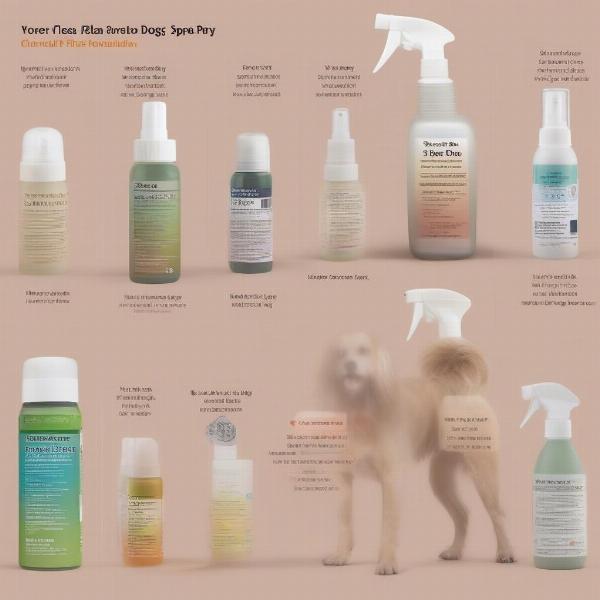Finding the right flea spray for your dog can feel overwhelming. With so many products on the market, it’s crucial to choose one that’s both effective and safe for your furry friend. This guide will walk you through everything you need to know about flea sprays for dogs, from understanding different types to choosing the right one for your dog’s specific needs. We’ll also cover important safety precautions and offer tips for preventing future infestations.
Types of Flea Sprays for Dogs
Several types of flea sprays are available, each with its own advantages and disadvantages. Understanding the differences can help you make an informed decision.
- Chemical Flea Sprays: These sprays typically contain synthetic insecticides that kill fleas quickly. While effective, they can sometimes cause skin irritation in sensitive dogs. Always follow the instructions carefully.
- Natural Flea Sprays: Made with plant-based ingredients like essential oils, natural flea sprays offer a gentler alternative. However, they may not be as potent as chemical sprays and may require more frequent applications.
- Flea and Tick Sprays: These combination products offer protection against both fleas and ticks. They’re a convenient choice, especially in areas where both pests are prevalent.
 Types of Flea Sprays for Dogs
Types of Flea Sprays for Dogs
Choosing the Right Flea Spray
Selecting the right flea spray depends on several factors, including your dog’s age, breed, size, and overall health.
- Age and Health: Puppies and senior dogs often have more sensitive skin, requiring a gentler formula. If your dog has any underlying health conditions, consult your veterinarian before using any flea spray.
- Breed and Size: Certain breeds are more susceptible to flea infestations. The size of your dog determines the appropriate dosage.
- Severity of Infestation: For heavy infestations, a more potent spray may be necessary.
Applying Flea Spray Safely
Always follow the manufacturer’s instructions carefully when applying flea spray.
- Protective Gear: Wear gloves to prevent skin contact with the spray.
- Outdoor Application: Apply the spray outdoors in a well-ventilated area.
- Even Coverage: Ensure even coverage, focusing on areas where fleas are likely to hide, such as the neck, back, and tail base.
- Avoid Eyes and Mouth: Take care to avoid spraying near your dog’s eyes and mouth.
- Monitor for Reactions: After application, monitor your dog for any signs of skin irritation or allergic reactions.
Preventing Future Infestations
Preventing future flea infestations requires a multi-pronged approach.
- Regular Grooming: Frequent brushing and bathing can help remove fleas and their eggs.
- Vacuuming and Cleaning: Regularly vacuum your home and wash your dog’s bedding to eliminate fleas in the environment.
- Yard Maintenance: Keep your yard trimmed and free of debris to reduce flea breeding grounds.
- Preventative Treatments: Consider using a preventative flea treatment like a monthly topical or oral medication, as recommended by your veterinarian. flea and tick spray dogs This can help keep fleas at bay year-round.
Conclusion
Choosing and applying the right flea spray is an essential part of responsible dog ownership. By understanding the different types of sprays available, considering your dog’s individual needs, and following safety precautions, you can effectively protect your furry friend from these pesky parasites. Remember to consult with your veterinarian if you have any concerns about flea control or your dog’s health. flea sprays for dogs Maintaining a clean environment and using preventative measures can significantly reduce the risk of future infestations, ensuring your dog remains happy and healthy. sesame oil in flea spray for dogs dog flea spray for dogs
FAQ
- How often should I apply flea spray to my dog? Always follow the manufacturer’s instructions. Over-application can be harmful.
- Can I use flea spray on puppies? Some flea sprays are safe for puppies. Choose a formula specifically designed for young dogs. natural flea spray for dogs
- What should I do if my dog has an allergic reaction to flea spray? Contact your veterinarian immediately.
- Are natural flea sprays as effective as chemical sprays? Natural sprays may require more frequent applications.
- How can I prevent fleas in my home? Regular cleaning and vacuuming are essential.
- What are the signs of a flea infestation? Excessive scratching, biting, and hair loss are common signs.
- Can fleas transmit diseases to dogs? Yes, fleas can transmit diseases such as tapeworms and Bartonellosis.
ILM Dog is your trusted resource for expert dog care advice. We offer comprehensive information on dog breeds, health, training, nutrition, grooming, and much more. From puppy care to senior dog support, we’re here to help you provide the best possible care for your canine companion. Our expertise covers everything from breed selection to health and wellness, ensuring your furry friend receives the best care possible. Contact us today for personalized advice: Email: [email protected], Phone: +44 20-3965-8624. Visit ILM Dog for more information.